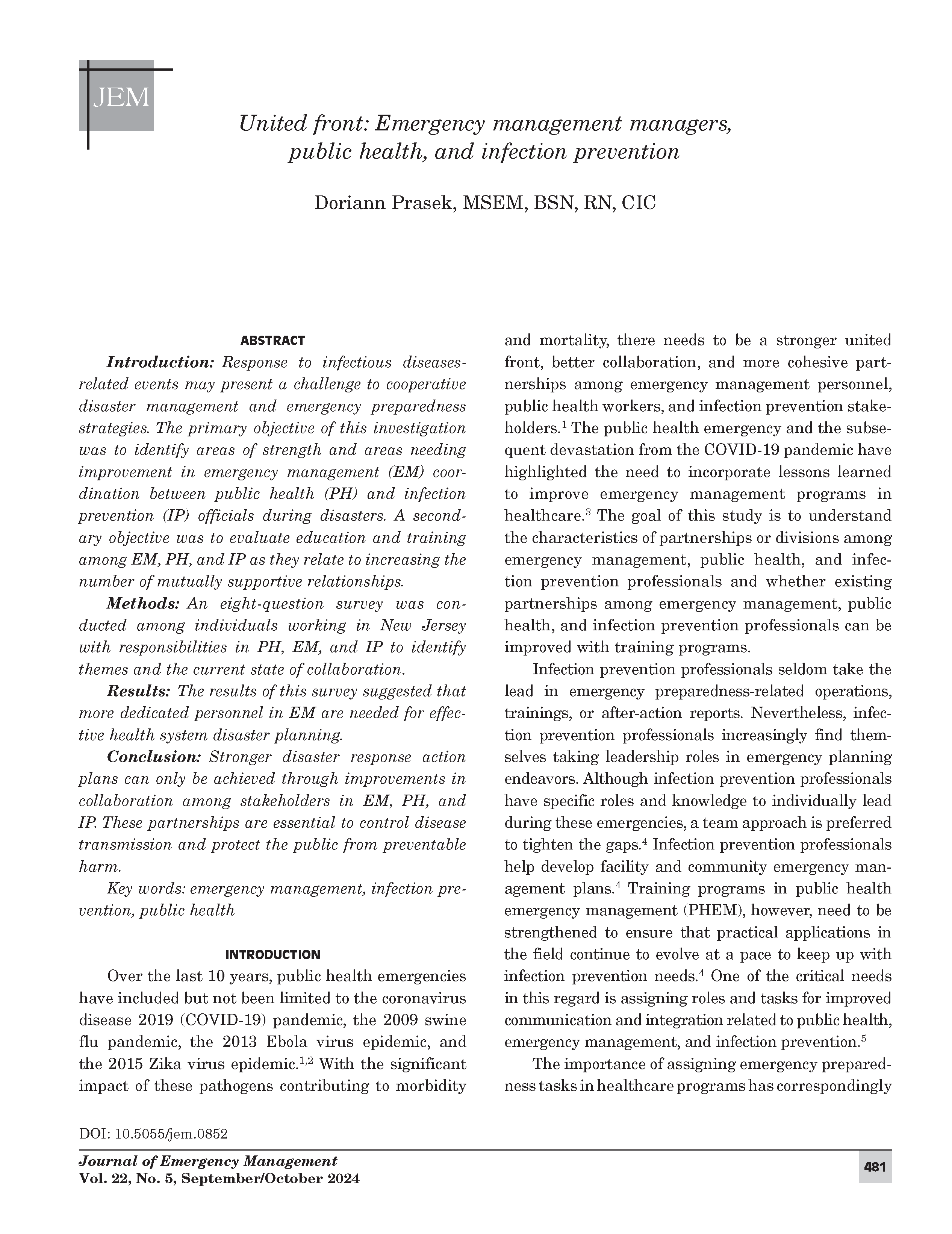United front: Emergency management managers, public health, and infection prevention
DOI:
https://doi.org/10.5055/jem.0852Keywords:
emergency management, infection prevention, public healthAbstract
Introduction: Response to infectious diseases-related events may present a challenge to cooperative disaster management and emergency preparedness strategies. The primary objective of this investigation was to identify areas of strength and areas needing improvement in emergency management (EM) coordination between public health (PH) and infection prevention (IP) officials during disasters. A secondary objective was to evaluate education and training among EM, PH, and IP as they relate to increasing the number of mutually supportive relationships.
Methods: An eight-question survey was conducted among individuals working in New Jersey with responsibilities in PH, EM, and IP to identify themes and the current state of collaboration.
Results: The results of this survey suggested that more dedicated personnel in EM are needed for effective health system disaster planning.
Conclusion: Stronger disaster response action plans can only be achieved through improvements in collaboration among stakeholders in EM, PH, and IP. These partnerships are essential to control disease transmission and protect the public from preventable harm.
References
Rose DA, Murthy S, Brooks J, et al.: The evolution of public health emergency management as a field of practice. Am J Public Health. 2017; 107(S2): S126-S133. DOI: 10.2105/ajph.2017.303947. DOI: https://doi.org/10.2105/AJPH.2017.303947
Baker R, Mahmud AS, Miller AF, et al.: Infectious disease in an era of global change. Nat Rev Microbiol. 2022; 20: 193-205. DOI: 10.1038/s41579-021-00639-z. DOI: https://doi.org/10.1038/s41579-021-00639-z
DeSalvo K, Hughes B, Bassett M, et al.: Public health COVID-19 impact assessment: Lessons learned and compelling needs. NAM Perspect. 2021. DOI: 10.31478/202104c. DOI: https://doi.org/10.31478/202104c
Rebmann T: The role of the infection preventionist in emergency management. Am J Infect Control. 2008; 37(4): 271-281. DOI: 10.1016/j.ajic.2008.12.002. DOI: https://doi.org/10.1016/j.ajic.2008.12.002
Sharma SK, Sharma N: Hospital preparedness and resilience in public health emergencies at district hospitals and community health centres. J Health Manag. 2020; 22(2): 146-156. DOI: 10.1177/0972063420935539. DOI: https://doi.org/10.1177/0972063420935539
Herstein JJ, Schwedhelm MM, Vasa A, et al.: Emergency preparedness: What is the future? Antimicrobial stewardship. Healthc Epidemiol. 2021; 1(1). DOI: 10.1017/ash.2021.190. DOI: https://doi.org/10.1017/ash.2021.190
McDonald WG: The importance of a dedicated emergency manager in a US hospitals. MOJ Public Health. 2016; 4(1). DOI: 10.15406/mojph.2016.04.00068. DOI: https://doi.org/10.15406/mojph.2016.04.00068
Vielot N, Horney J: Can merging the roles of public health preparedness and emergency management increase the efficiency and effectiveness of emergency planning and response? Int J Environ Res Public Health. 2014; 11(3): 2911-2921. DOI: 10.3390/ijerph110302911. DOI: https://doi.org/10.3390/ijerph110302911
Fos PJ, Honoré PA, Honoré RL: Coordination of public health response: The role of leadership in responding to public health emergencies. In Science-Based Approaches to Respond to COVID and Other Public Health Threats. London: IntechOpen, 2021. DOI: 10.5772/intechopen.96304. DOI: https://doi.org/10.5772/intechopen.96304
Khan Y, O’Sullivan T, Brown A, et al.: Public health emergency preparedness: A framework to promote resilience. BMC Public Health. 2018; 18(1). DOI: 10.1186/s12889-018-6250-7. DOI: https://doi.org/10.1186/s12889-018-6250-7
Soujaa I, Nukpezah JA, Benavides AD: Coordination effectiveness during public health emergencies: An institutional collective action framework. Adm Soc. 2021; 53(7): 1014-1045. DOI: 10.1177/0095399720985440. DOI: https://doi.org/10.1177/0095399720985440
Centers for Disease Control and Prevention (CDC): Emergency preparedness and response. 2020. Available at https://emergency.cdc.gov/. Accessed October 6, 2023.
Lee JM, Jansen R, Sanderson KE, et al.: Public health emergency preparedness for infectious disease emergencies: A scoping review of recent evidence. BMC Public Health. 2023; 23(420). DOI: 10.1186/s12889-023-15313-7. DOI: https://doi.org/10.1186/s12889-023-15313-7
CDC: Public health emergency preparedness and response capabilities: National standards for state, local, tribal, and territorial public health. 2018. Available at https://www.cdc.gov/orr/readiness/00_docs/CDC_PreparednesResponseCapabilities_October2018_Final_508.pdf. Accessed October 7, 2023.
Leach M, MacGregor H, Ripoll S, et al.: Rethinking disease preparedness: Incertitude and the politics of knowledge. Crit Public Health. 2022; 32(1): 82-96. DOI: 10.1080/09581596.2021.1885628. DOI: https://doi.org/10.1080/09581596.2021.1885628
Adini B, Ohana A, Furman E, et al.: Learning lessons in emergency management: The 4th international conference on healthcare system preparedness and response to emergencies and disasters. Disaster Mil Med. 2016; 2(1). DOI: 10.1186/s40696-016-0026-3. DOI: https://doi.org/10.1186/s40696-016-0026-3
CDC: Fellowships and training opportunities. Available at https://www.cdc.gov/fellowships/index.html. Accessed April 24, 2023.
Schumacher L, Senhaji S, Gartner BA: Full-scale simulations to improve disaster preparedness in hospital pharmacies. BMC Health Serv Res. 2022; 22(853): 1-10. DOI: 10.1186/s12913-022-08230-9. DOI: https://doi.org/10.1186/s12913-022-08230-9

Published
How to Cite
Issue
Section
License
Copyright 2007-2025, Weston Medical Publishing, LLC and Journal of Emergency Management. All Rights Reserved.





